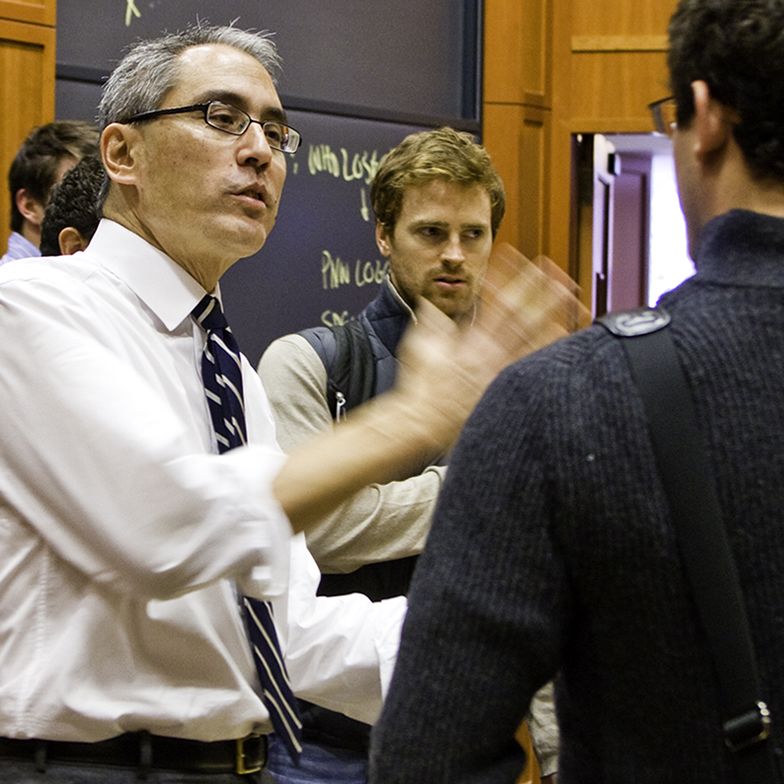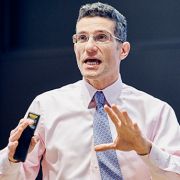Israel
Israel
“Water is scarce here,” says Danielle Golan, assistant director of the Israel Research Office, who worked with Reinhardt, the John D. Black Professor of Business Administration, and Natalie Kindred, program director of the School’s Agribusiness Seminar, to author the case. “We are in the middle of a desert without a lot of rainfall.”
Reinhardt, who notes that Golan’s on-the-ground presence in Israel was instrumental in writing the case, taught it to two groups of executives in the January 2021 Agribusiness Seminar as well as to students in his Food and Agribusiness MBA elective. “The goal of the case discussion is to help course participants and students understand how economic institutions and corporate strategy interact in a world where ‘sustainability’ is a much-invoked but often incompletely understood notion,” explains Reinhardt.
Netafim was founded in Israel’s Negev desert in 1965. Since then, the firm, whose tagline is “grow more with less,” has learned through trial and error how to combine precision irrigation, agronomic expertise, and relentless innovation to help farmers grow more of any crop, in any climate, with less water.
“Everyone knows that farmers’ appetite for water exceeds supply in many regions. Netafim—astute, technologically sophisticated, and committed to improving agriculture efficiency—is designed to address this problem.”
John D. Black Professor of Business Administration

“Everyone knows that farmers’ appetite for water exceeds supply in many regions. Netafim—astute, technologically sophisticated, and committed to improving agriculture efficiency—is designed to address this problem.”
John D. Black Professor of Business Administration
The case presents Netafim’s new CEO, Gaby Miodownik, in 2019 as he considers expanding the firm from a supplier of precision drip irrigation products into a service-based enterprise that provides full- scale drip irrigation systems to customers. Netafim’s digital farming platform, Netbeat, was designed to “empower farmers to monitor, analyze, and control their irrigation systems,” but the firm, which was acquired by global conglomerate Orbia in 2018, was having difficulty convincing customers to make the investment. Miodownik participated remotely during the case discussion in the Food and Agribusiness elective course to explain to students the challenges he was facing.
“In many markets, the top disincentive to investing in irrigation was the free or low-cost availability of water to farmers,” write the case authors. “Despite irrigation’s benefits—predictable growing schedules, better yields, potentially higher returns, savings of water and other resources, improved sustainability, etc.—most global cropland was not irrigated in 2020, and only 19 million hectares, about 6 to 7 percent of irrigated land, used drip technology.”
Drip irrigation is the most effective at conserving water because the water is funneled directly to the root zones of plants and the slow flow ensures uniform delivery. Because drip systems apply water and nutrients with precision, do not dampen the plant and cause fungal harm, and can be used on any terrain, yields of drip-irrigated crops can be 50 to 100 percent higher than those of crops irrigated with other methods.
Miodownik is faced with the challenge of slow growth in demand for Netafim’s system as well as an increase in competition. “Everyone knows that farmers’ appetite for water exceeds supply in many regions. Netafim—astute, technologically sophisticated, and committed to improving agriculture efficiency—is designed to address this problem,” says Reinhardt. “But many of the institutional systems for water allocation don’t create price-based incentives to use water sensibly. This makes the challenge for Netafim much more complicated.”
Forging Connections through Technology

